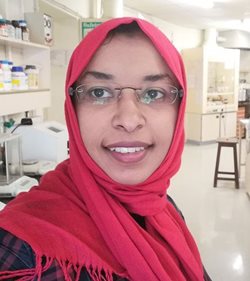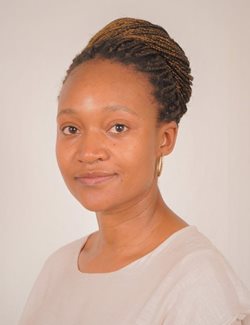





This programme identifies and rewards young talented researchers in the formal sciences, life and environmental sciences, material sciences, engineering sciences and technological sciences with the aim of promoting and encouraging the participation of young African women in science.

Ali, from the Department of Chemistry, is working on the development of new cancer treatments using a ground-breaking synthetic methodology based on garlic-like compounds which are able to fight cancer cells.
During 2017-2018 she developed a new synthesis methodology for accessing specific chemical constituents in garlic which was published in the prestigious Journal of Organic Chemistry in early 2019. She and her colleagues have used this method which is extremely fast – complete within approximately 30 seconds to a minute – to further develop an understanding towards the design of superior and novel active anti-cancer agents.

Tamuhla, from the Department of Computational Biology, is collecting clinical and genetic data to better understand the emerging pandemic of type 2 diabetes in Africa. Until recently, limited data was available for human genomes from Africa but increasing volumes of such data are now being generated along with an increasing collection of electronic routine health data. Her research project will demonstrate the power and utility of integrating routine healthcare data with genomic data to identify genetic drivers of disease in African populations.
As Africa makes advances in human genomics and moves towards precision medicine, she believes the knowledge and skills she is gaining from her multi-disciplinary PhD, will place her in a position to conduct quality research that will not only add to the body of knowledge but influence health policy and patient care and ultimately improve patient outcomes.
Both Ali and Tamuhla have aspirations of taking their research even further and proving that Africa can continue being a leader in scientific research.